Leadership and Management for Service Industries
VerifiedAdded on 2023/06/18
|14
|4969
|202
AI Summary
This report discusses the different classical management theories, leadership styles, and management skills required in the service industry, specifically in the hospitality sector. It also explores the internal and external factors influencing management styles and structures. The report provides evidence from the service sector on current management skills and leadership 'hard' and 'soft' skills.
Contribute Materials
Your contribution can guide someone’s learning journey. Share your
documents today.
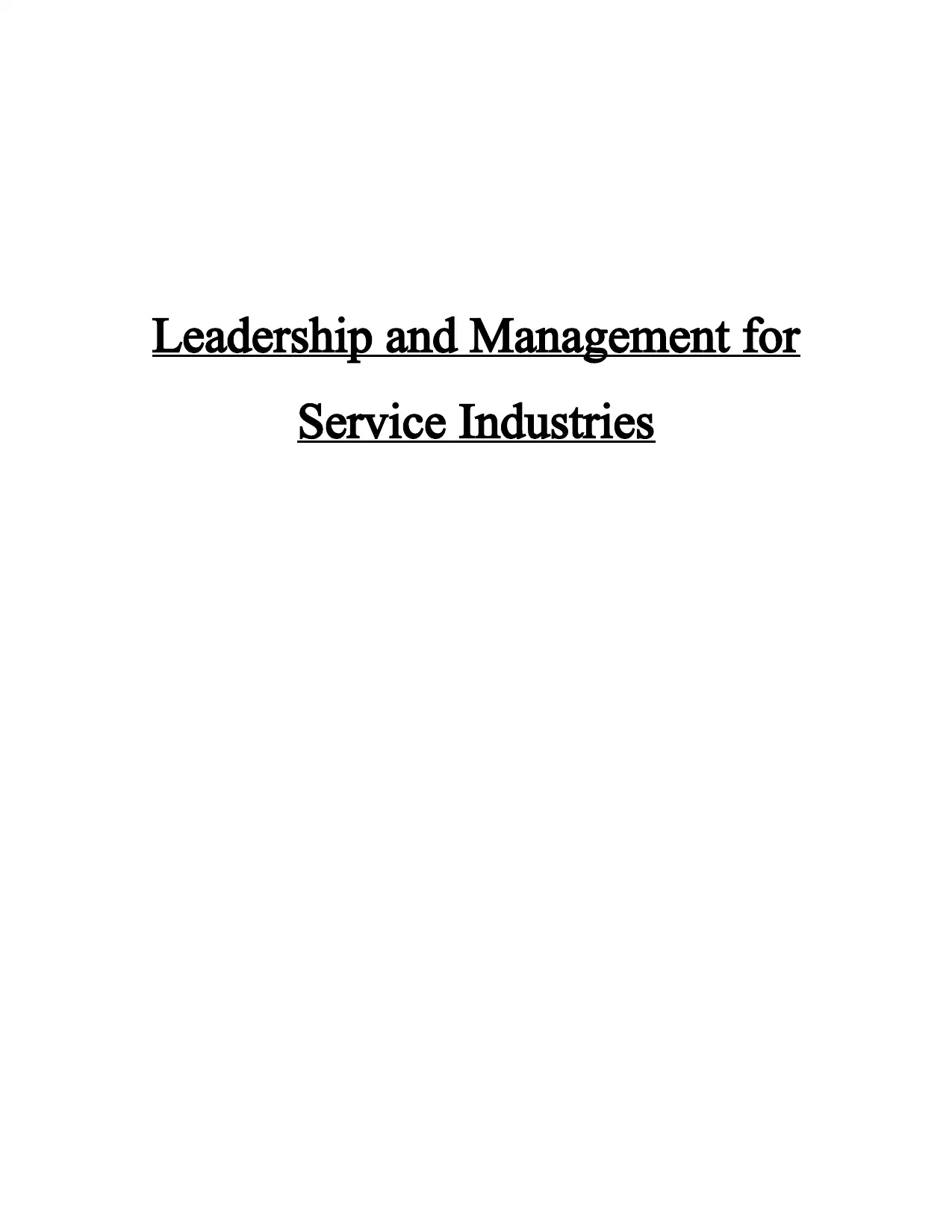
Leadership and Management for
Service Industries
Service Industries
Secure Best Marks with AI Grader
Need help grading? Try our AI Grader for instant feedback on your assignments.
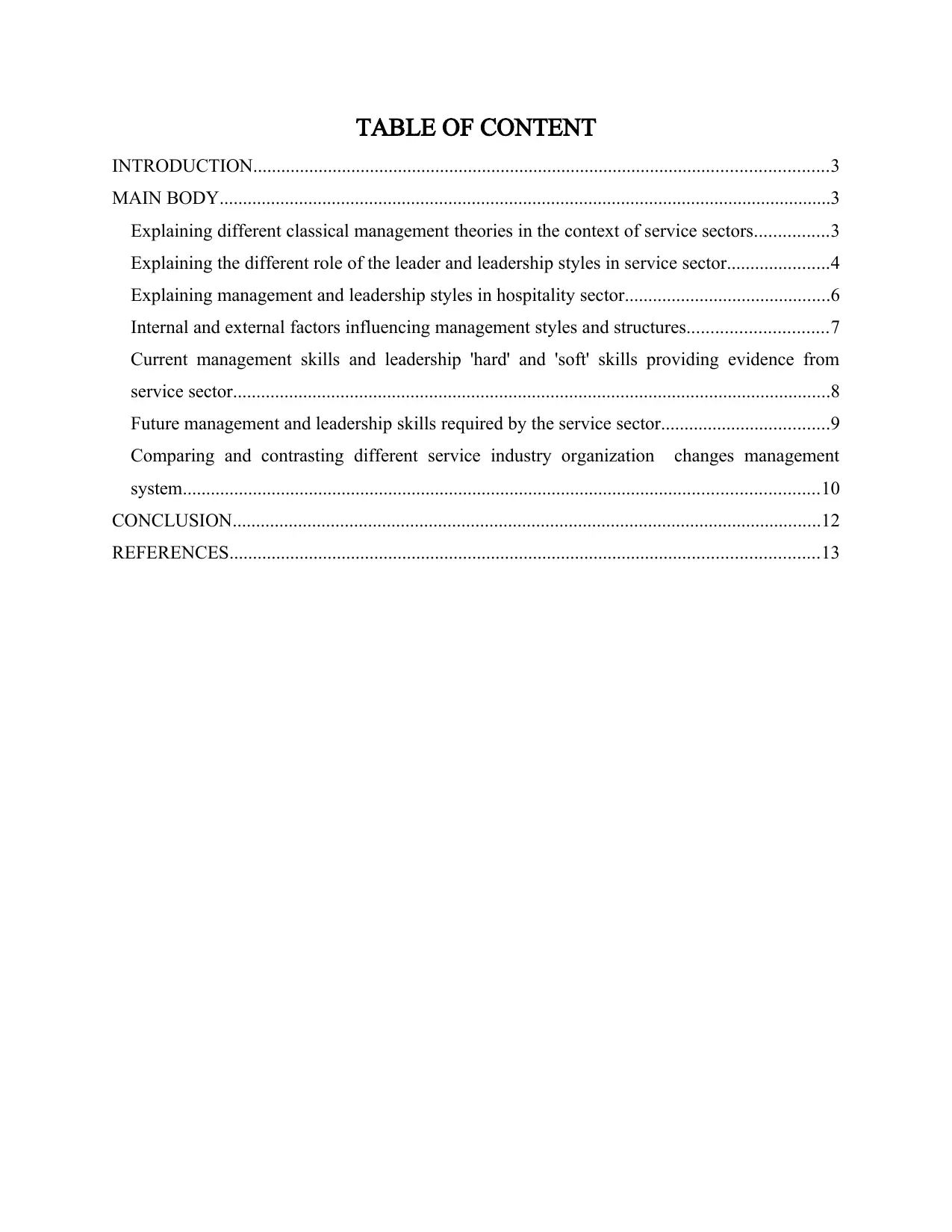
TABLE OF CONTENT
INTRODUCTION...........................................................................................................................3
MAIN BODY...................................................................................................................................3
Explaining different classical management theories in the context of service sectors................3
Explaining the different role of the leader and leadership styles in service sector......................4
Explaining management and leadership styles in hospitality sector............................................6
Internal and external factors influencing management styles and structures..............................7
Current management skills and leadership 'hard' and 'soft' skills providing evidence from
service sector................................................................................................................................8
Future management and leadership skills required by the service sector....................................9
Comparing and contrasting different service industry organization changes management
system........................................................................................................................................10
CONCLUSION..............................................................................................................................12
REFERENCES..............................................................................................................................13
INTRODUCTION...........................................................................................................................3
MAIN BODY...................................................................................................................................3
Explaining different classical management theories in the context of service sectors................3
Explaining the different role of the leader and leadership styles in service sector......................4
Explaining management and leadership styles in hospitality sector............................................6
Internal and external factors influencing management styles and structures..............................7
Current management skills and leadership 'hard' and 'soft' skills providing evidence from
service sector................................................................................................................................8
Future management and leadership skills required by the service sector....................................9
Comparing and contrasting different service industry organization changes management
system........................................................................................................................................10
CONCLUSION..............................................................................................................................12
REFERENCES..............................................................................................................................13
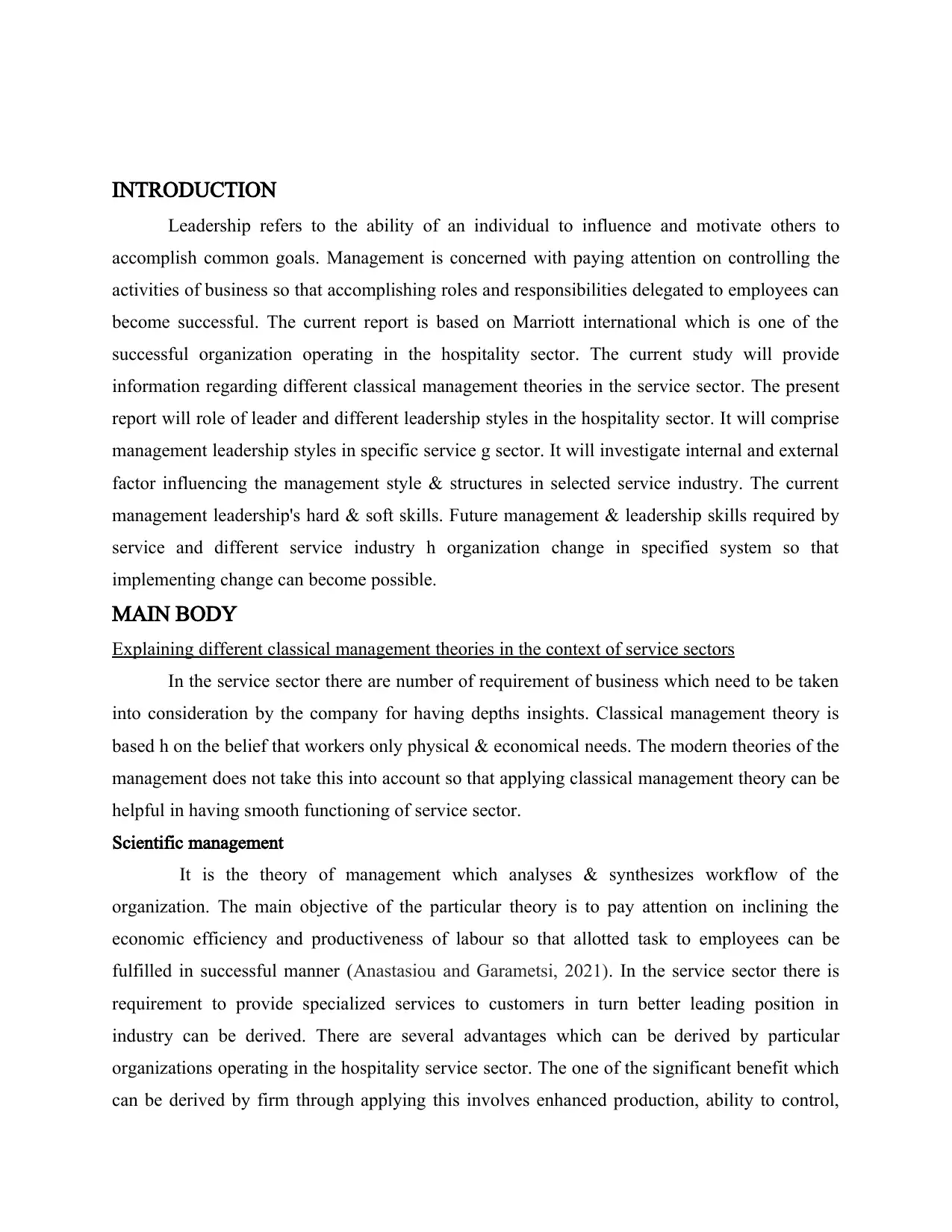
INTRODUCTION
Leadership refers to the ability of an individual to influence and motivate others to
accomplish common goals. Management is concerned with paying attention on controlling the
activities of business so that accomplishing roles and responsibilities delegated to employees can
become successful. The current report is based on Marriott international which is one of the
successful organization operating in the hospitality sector. The current study will provide
information regarding different classical management theories in the service sector. The present
report will role of leader and different leadership styles in the hospitality sector. It will comprise
management leadership styles in specific service g sector. It will investigate internal and external
factor influencing the management style & structures in selected service industry. The current
management leadership's hard & soft skills. Future management & leadership skills required by
service and different service industry h organization change in specified system so that
implementing change can become possible.
MAIN BODY
Explaining different classical management theories in the context of service sectors
In the service sector there are number of requirement of business which need to be taken
into consideration by the company for having depths insights. Classical management theory is
based h on the belief that workers only physical & economical needs. The modern theories of the
management does not take this into account so that applying classical management theory can be
helpful in having smooth functioning of service sector.
Scientific management
It is the theory of management which analyses & synthesizes workflow of the
organization. The main objective of the particular theory is to pay attention on inclining the
economic efficiency and productiveness of labour so that allotted task to employees can be
fulfilled in successful manner (Anastasiou and Garametsi, 2021). In the service sector there is
requirement to provide specialized services to customers in turn better leading position in
industry can be derived. There are several advantages which can be derived by particular
organizations operating in the hospitality service sector. The one of the significant benefit which
can be derived by firm through applying this involves enhanced production, ability to control,
Leadership refers to the ability of an individual to influence and motivate others to
accomplish common goals. Management is concerned with paying attention on controlling the
activities of business so that accomplishing roles and responsibilities delegated to employees can
become successful. The current report is based on Marriott international which is one of the
successful organization operating in the hospitality sector. The current study will provide
information regarding different classical management theories in the service sector. The present
report will role of leader and different leadership styles in the hospitality sector. It will comprise
management leadership styles in specific service g sector. It will investigate internal and external
factor influencing the management style & structures in selected service industry. The current
management leadership's hard & soft skills. Future management & leadership skills required by
service and different service industry h organization change in specified system so that
implementing change can become possible.
MAIN BODY
Explaining different classical management theories in the context of service sectors
In the service sector there are number of requirement of business which need to be taken
into consideration by the company for having depths insights. Classical management theory is
based h on the belief that workers only physical & economical needs. The modern theories of the
management does not take this into account so that applying classical management theory can be
helpful in having smooth functioning of service sector.
Scientific management
It is the theory of management which analyses & synthesizes workflow of the
organization. The main objective of the particular theory is to pay attention on inclining the
economic efficiency and productiveness of labour so that allotted task to employees can be
fulfilled in successful manner (Anastasiou and Garametsi, 2021). In the service sector there is
requirement to provide specialized services to customers in turn better leading position in
industry can be derived. There are several advantages which can be derived by particular
organizations operating in the hospitality service sector. The one of the significant benefit which
can be derived by firm through applying this involves enhanced production, ability to control,
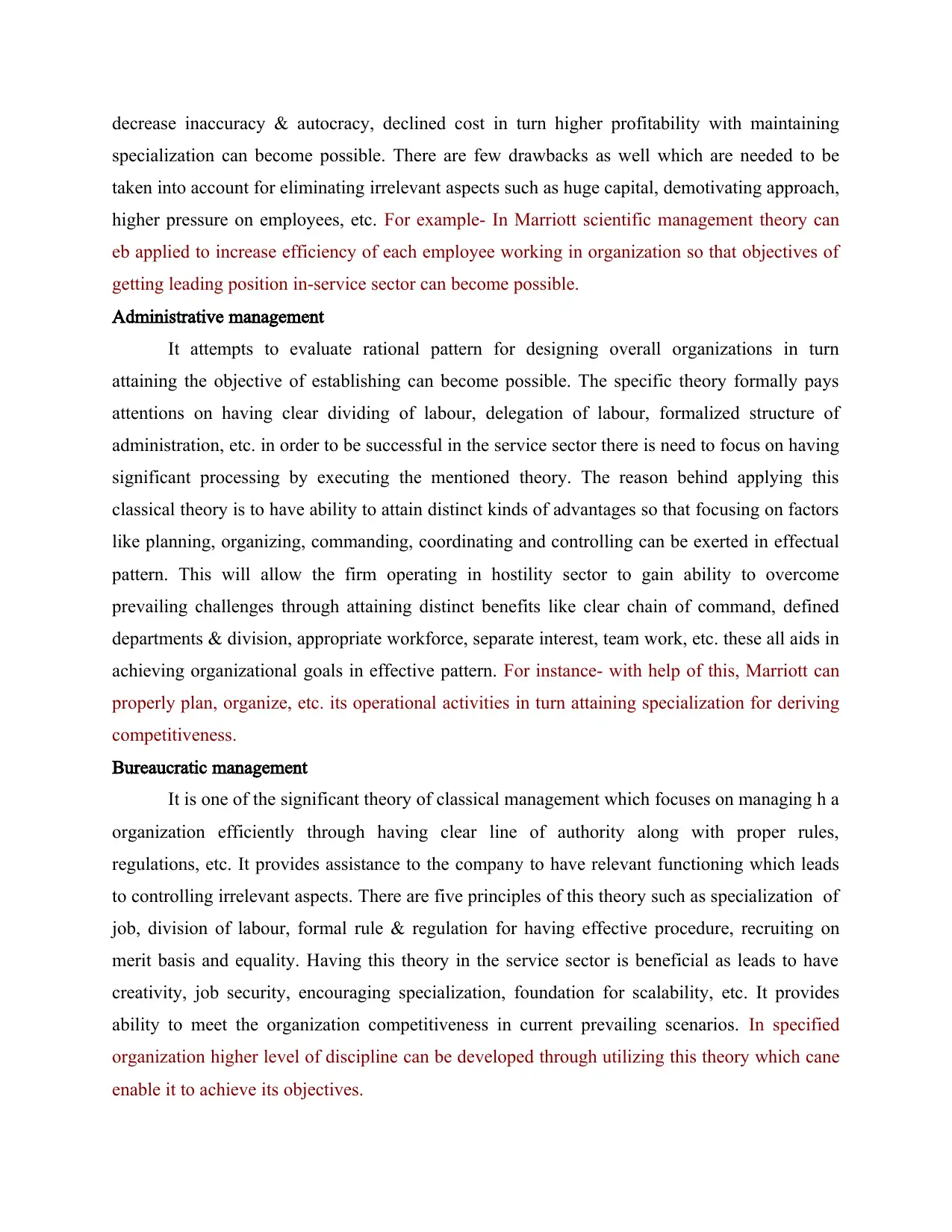
decrease inaccuracy & autocracy, declined cost in turn higher profitability with maintaining
specialization can become possible. There are few drawbacks as well which are needed to be
taken into account for eliminating irrelevant aspects such as huge capital, demotivating approach,
higher pressure on employees, etc. For example- In Marriott scientific management theory can
eb applied to increase efficiency of each employee working in organization so that objectives of
getting leading position in-service sector can become possible.
Administrative management
It attempts to evaluate rational pattern for designing overall organizations in turn
attaining the objective of establishing can become possible. The specific theory formally pays
attentions on having clear dividing of labour, delegation of labour, formalized structure of
administration, etc. in order to be successful in the service sector there is need to focus on having
significant processing by executing the mentioned theory. The reason behind applying this
classical theory is to have ability to attain distinct kinds of advantages so that focusing on factors
like planning, organizing, commanding, coordinating and controlling can be exerted in effectual
pattern. This will allow the firm operating in hostility sector to gain ability to overcome
prevailing challenges through attaining distinct benefits like clear chain of command, defined
departments & division, appropriate workforce, separate interest, team work, etc. these all aids in
achieving organizational goals in effective pattern. For instance- with help of this, Marriott can
properly plan, organize, etc. its operational activities in turn attaining specialization for deriving
competitiveness.
Bureaucratic management
It is one of the significant theory of classical management which focuses on managing h a
organization efficiently through having clear line of authority along with proper rules,
regulations, etc. It provides assistance to the company to have relevant functioning which leads
to controlling irrelevant aspects. There are five principles of this theory such as specialization of
job, division of labour, formal rule & regulation for having effective procedure, recruiting on
merit basis and equality. Having this theory in the service sector is beneficial as leads to have
creativity, job security, encouraging specialization, foundation for scalability, etc. It provides
ability to meet the organization competitiveness in current prevailing scenarios. In specified
organization higher level of discipline can be developed through utilizing this theory which cane
enable it to achieve its objectives.
specialization can become possible. There are few drawbacks as well which are needed to be
taken into account for eliminating irrelevant aspects such as huge capital, demotivating approach,
higher pressure on employees, etc. For example- In Marriott scientific management theory can
eb applied to increase efficiency of each employee working in organization so that objectives of
getting leading position in-service sector can become possible.
Administrative management
It attempts to evaluate rational pattern for designing overall organizations in turn
attaining the objective of establishing can become possible. The specific theory formally pays
attentions on having clear dividing of labour, delegation of labour, formalized structure of
administration, etc. in order to be successful in the service sector there is need to focus on having
significant processing by executing the mentioned theory. The reason behind applying this
classical theory is to have ability to attain distinct kinds of advantages so that focusing on factors
like planning, organizing, commanding, coordinating and controlling can be exerted in effectual
pattern. This will allow the firm operating in hostility sector to gain ability to overcome
prevailing challenges through attaining distinct benefits like clear chain of command, defined
departments & division, appropriate workforce, separate interest, team work, etc. these all aids in
achieving organizational goals in effective pattern. For instance- with help of this, Marriott can
properly plan, organize, etc. its operational activities in turn attaining specialization for deriving
competitiveness.
Bureaucratic management
It is one of the significant theory of classical management which focuses on managing h a
organization efficiently through having clear line of authority along with proper rules,
regulations, etc. It provides assistance to the company to have relevant functioning which leads
to controlling irrelevant aspects. There are five principles of this theory such as specialization of
job, division of labour, formal rule & regulation for having effective procedure, recruiting on
merit basis and equality. Having this theory in the service sector is beneficial as leads to have
creativity, job security, encouraging specialization, foundation for scalability, etc. It provides
ability to meet the organization competitiveness in current prevailing scenarios. In specified
organization higher level of discipline can be developed through utilizing this theory which cane
enable it to achieve its objectives.
Secure Best Marks with AI Grader
Need help grading? Try our AI Grader for instant feedback on your assignments.
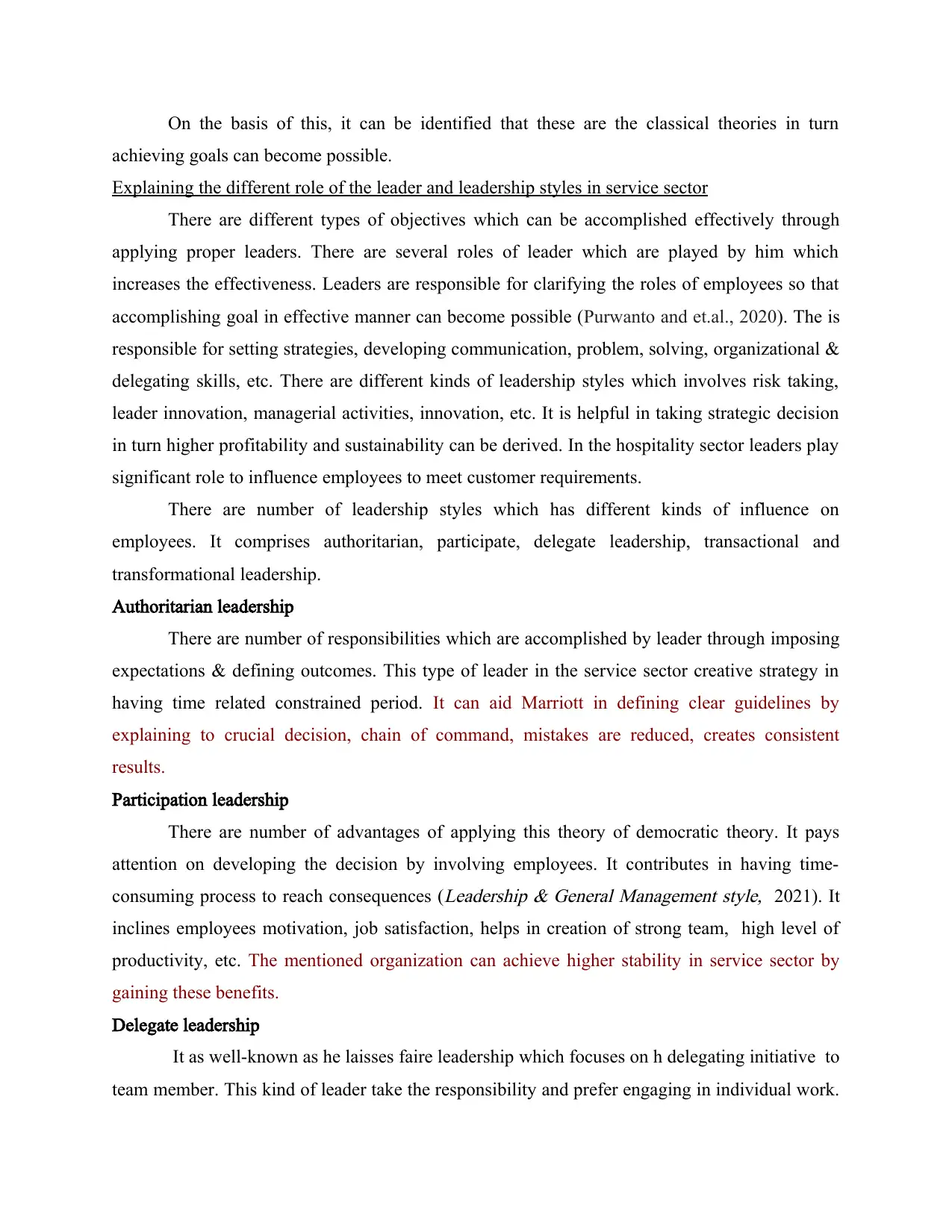
On the basis of this, it can be identified that these are the classical theories in turn
achieving goals can become possible.
Explaining the different role of the leader and leadership styles in service sector
There are different types of objectives which can be accomplished effectively through
applying proper leaders. There are several roles of leader which are played by him which
increases the effectiveness. Leaders are responsible for clarifying the roles of employees so that
accomplishing goal in effective manner can become possible (Purwanto and et.al., 2020). The is
responsible for setting strategies, developing communication, problem, solving, organizational &
delegating skills, etc. There are different kinds of leadership styles which involves risk taking,
leader innovation, managerial activities, innovation, etc. It is helpful in taking strategic decision
in turn higher profitability and sustainability can be derived. In the hospitality sector leaders play
significant role to influence employees to meet customer requirements.
There are number of leadership styles which has different kinds of influence on
employees. It comprises authoritarian, participate, delegate leadership, transactional and
transformational leadership.
Authoritarian leadership
There are number of responsibilities which are accomplished by leader through imposing
expectations & defining outcomes. This type of leader in the service sector creative strategy in
having time related constrained period. It can aid Marriott in defining clear guidelines by
explaining to crucial decision, chain of command, mistakes are reduced, creates consistent
results.
Participation leadership
There are number of advantages of applying this theory of democratic theory. It pays
attention on developing the decision by involving employees. It contributes in having time-
consuming process to reach consequences (
Leadership & General Management style, 2021). It
inclines employees motivation, job satisfaction, helps in creation of strong team, high level of
productivity, etc. The mentioned organization can achieve higher stability in service sector by
gaining these benefits.
Delegate leadership
It as well-known as he laisses faire leadership which focuses on h delegating initiative to
team member. This kind of leader take the responsibility and prefer engaging in individual work.
achieving goals can become possible.
Explaining the different role of the leader and leadership styles in service sector
There are different types of objectives which can be accomplished effectively through
applying proper leaders. There are several roles of leader which are played by him which
increases the effectiveness. Leaders are responsible for clarifying the roles of employees so that
accomplishing goal in effective manner can become possible (Purwanto and et.al., 2020). The is
responsible for setting strategies, developing communication, problem, solving, organizational &
delegating skills, etc. There are different kinds of leadership styles which involves risk taking,
leader innovation, managerial activities, innovation, etc. It is helpful in taking strategic decision
in turn higher profitability and sustainability can be derived. In the hospitality sector leaders play
significant role to influence employees to meet customer requirements.
There are number of leadership styles which has different kinds of influence on
employees. It comprises authoritarian, participate, delegate leadership, transactional and
transformational leadership.
Authoritarian leadership
There are number of responsibilities which are accomplished by leader through imposing
expectations & defining outcomes. This type of leader in the service sector creative strategy in
having time related constrained period. It can aid Marriott in defining clear guidelines by
explaining to crucial decision, chain of command, mistakes are reduced, creates consistent
results.
Participation leadership
There are number of advantages of applying this theory of democratic theory. It pays
attention on developing the decision by involving employees. It contributes in having time-
consuming process to reach consequences (
Leadership & General Management style, 2021). It
inclines employees motivation, job satisfaction, helps in creation of strong team, high level of
productivity, etc. The mentioned organization can achieve higher stability in service sector by
gaining these benefits.
Delegate leadership
It as well-known as he laisses faire leadership which focuses on h delegating initiative to
team member. This kind of leader take the responsibility and prefer engaging in individual work.
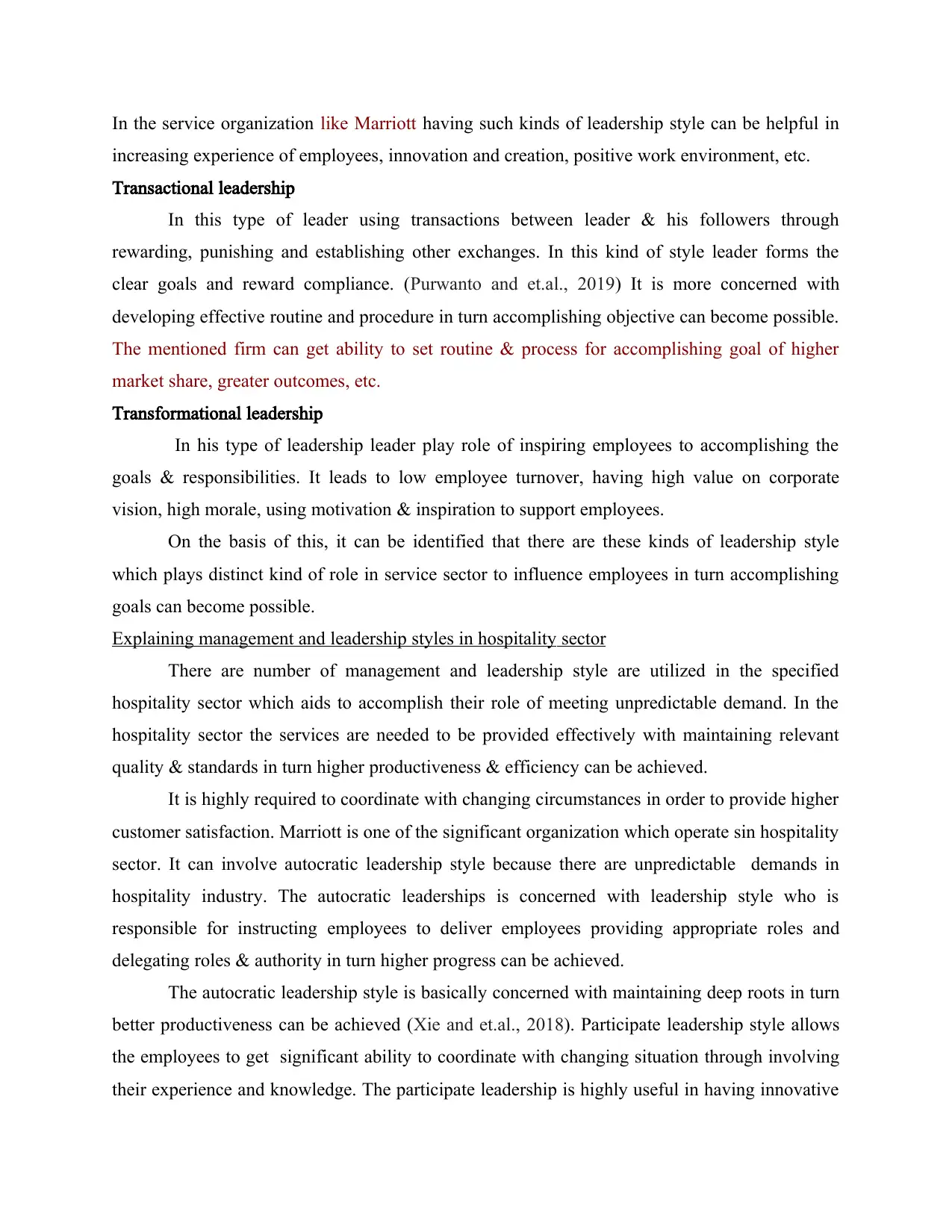
In the service organization like Marriott having such kinds of leadership style can be helpful in
increasing experience of employees, innovation and creation, positive work environment, etc.
Transactional leadership
In this type of leader using transactions between leader & his followers through
rewarding, punishing and establishing other exchanges. In this kind of style leader forms the
clear goals and reward compliance. (Purwanto and et.al., 2019) It is more concerned with
developing effective routine and procedure in turn accomplishing objective can become possible.
The mentioned firm can get ability to set routine & process for accomplishing goal of higher
market share, greater outcomes, etc.
Transformational leadership
In his type of leadership leader play role of inspiring employees to accomplishing the
goals & responsibilities. It leads to low employee turnover, having high value on corporate
vision, high morale, using motivation & inspiration to support employees.
On the basis of this, it can be identified that there are these kinds of leadership style
which plays distinct kind of role in service sector to influence employees in turn accomplishing
goals can become possible.
Explaining management and leadership styles in hospitality sector
There are number of management and leadership style are utilized in the specified
hospitality sector which aids to accomplish their role of meeting unpredictable demand. In the
hospitality sector the services are needed to be provided effectively with maintaining relevant
quality & standards in turn higher productiveness & efficiency can be achieved.
It is highly required to coordinate with changing circumstances in order to provide higher
customer satisfaction. Marriott is one of the significant organization which operate sin hospitality
sector. It can involve autocratic leadership style because there are unpredictable demands in
hospitality industry. The autocratic leaderships is concerned with leadership style who is
responsible for instructing employees to deliver employees providing appropriate roles and
delegating roles & authority in turn higher progress can be achieved.
The autocratic leadership style is basically concerned with maintaining deep roots in turn
better productiveness can be achieved (Xie and et.al., 2018). Participate leadership style allows
the employees to get significant ability to coordinate with changing situation through involving
their experience and knowledge. The participate leadership is highly useful in having innovative
increasing experience of employees, innovation and creation, positive work environment, etc.
Transactional leadership
In this type of leader using transactions between leader & his followers through
rewarding, punishing and establishing other exchanges. In this kind of style leader forms the
clear goals and reward compliance. (Purwanto and et.al., 2019) It is more concerned with
developing effective routine and procedure in turn accomplishing objective can become possible.
The mentioned firm can get ability to set routine & process for accomplishing goal of higher
market share, greater outcomes, etc.
Transformational leadership
In his type of leadership leader play role of inspiring employees to accomplishing the
goals & responsibilities. It leads to low employee turnover, having high value on corporate
vision, high morale, using motivation & inspiration to support employees.
On the basis of this, it can be identified that there are these kinds of leadership style
which plays distinct kind of role in service sector to influence employees in turn accomplishing
goals can become possible.
Explaining management and leadership styles in hospitality sector
There are number of management and leadership style are utilized in the specified
hospitality sector which aids to accomplish their role of meeting unpredictable demand. In the
hospitality sector the services are needed to be provided effectively with maintaining relevant
quality & standards in turn higher productiveness & efficiency can be achieved.
It is highly required to coordinate with changing circumstances in order to provide higher
customer satisfaction. Marriott is one of the significant organization which operate sin hospitality
sector. It can involve autocratic leadership style because there are unpredictable demands in
hospitality industry. The autocratic leaderships is concerned with leadership style who is
responsible for instructing employees to deliver employees providing appropriate roles and
delegating roles & authority in turn higher progress can be achieved.
The autocratic leadership style is basically concerned with maintaining deep roots in turn
better productiveness can be achieved (Xie and et.al., 2018). Participate leadership style allows
the employees to get significant ability to coordinate with changing situation through involving
their experience and knowledge. The participate leadership is highly useful in having innovative
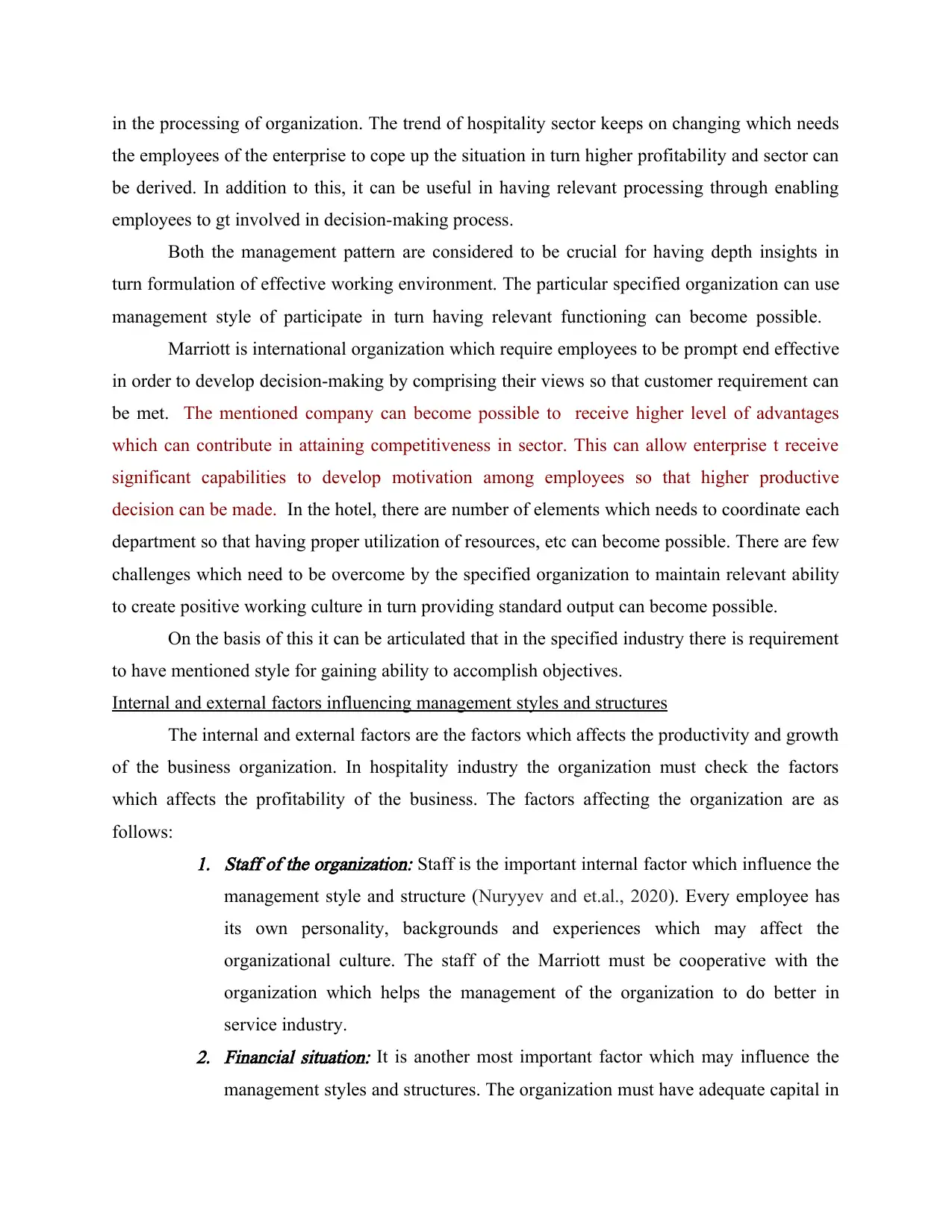
in the processing of organization. The trend of hospitality sector keeps on changing which needs
the employees of the enterprise to cope up the situation in turn higher profitability and sector can
be derived. In addition to this, it can be useful in having relevant processing through enabling
employees to gt involved in decision-making process.
Both the management pattern are considered to be crucial for having depth insights in
turn formulation of effective working environment. The particular specified organization can use
management style of participate in turn having relevant functioning can become possible.
Marriott is international organization which require employees to be prompt end effective
in order to develop decision-making by comprising their views so that customer requirement can
be met. The mentioned company can become possible to receive higher level of advantages
which can contribute in attaining competitiveness in sector. This can allow enterprise t receive
significant capabilities to develop motivation among employees so that higher productive
decision can be made. In the hotel, there are number of elements which needs to coordinate each
department so that having proper utilization of resources, etc can become possible. There are few
challenges which need to be overcome by the specified organization to maintain relevant ability
to create positive working culture in turn providing standard output can become possible.
On the basis of this it can be articulated that in the specified industry there is requirement
to have mentioned style for gaining ability to accomplish objectives.
Internal and external factors influencing management styles and structures
The internal and external factors are the factors which affects the productivity and growth
of the business organization. In hospitality industry the organization must check the factors
which affects the profitability of the business. The factors affecting the organization are as
follows:
1. Staff of the organization: Staff is the important internal factor which influence the
management style and structure (Nuryyev and et.al., 2020). Every employee has
its own personality, backgrounds and experiences which may affect the
organizational culture. The staff of the Marriott must be cooperative with the
organization which helps the management of the organization to do better in
service industry.
2. Financial situation: It is another most important factor which may influence the
management styles and structures. The organization must have adequate capital in
the employees of the enterprise to cope up the situation in turn higher profitability and sector can
be derived. In addition to this, it can be useful in having relevant processing through enabling
employees to gt involved in decision-making process.
Both the management pattern are considered to be crucial for having depth insights in
turn formulation of effective working environment. The particular specified organization can use
management style of participate in turn having relevant functioning can become possible.
Marriott is international organization which require employees to be prompt end effective
in order to develop decision-making by comprising their views so that customer requirement can
be met. The mentioned company can become possible to receive higher level of advantages
which can contribute in attaining competitiveness in sector. This can allow enterprise t receive
significant capabilities to develop motivation among employees so that higher productive
decision can be made. In the hotel, there are number of elements which needs to coordinate each
department so that having proper utilization of resources, etc can become possible. There are few
challenges which need to be overcome by the specified organization to maintain relevant ability
to create positive working culture in turn providing standard output can become possible.
On the basis of this it can be articulated that in the specified industry there is requirement
to have mentioned style for gaining ability to accomplish objectives.
Internal and external factors influencing management styles and structures
The internal and external factors are the factors which affects the productivity and growth
of the business organization. In hospitality industry the organization must check the factors
which affects the profitability of the business. The factors affecting the organization are as
follows:
1. Staff of the organization: Staff is the important internal factor which influence the
management style and structure (Nuryyev and et.al., 2020). Every employee has
its own personality, backgrounds and experiences which may affect the
organizational culture. The staff of the Marriott must be cooperative with the
organization which helps the management of the organization to do better in
service industry.
2. Financial situation: It is another most important factor which may influence the
management styles and structures. The organization must have adequate capital in
Paraphrase This Document
Need a fresh take? Get an instant paraphrase of this document with our AI Paraphraser
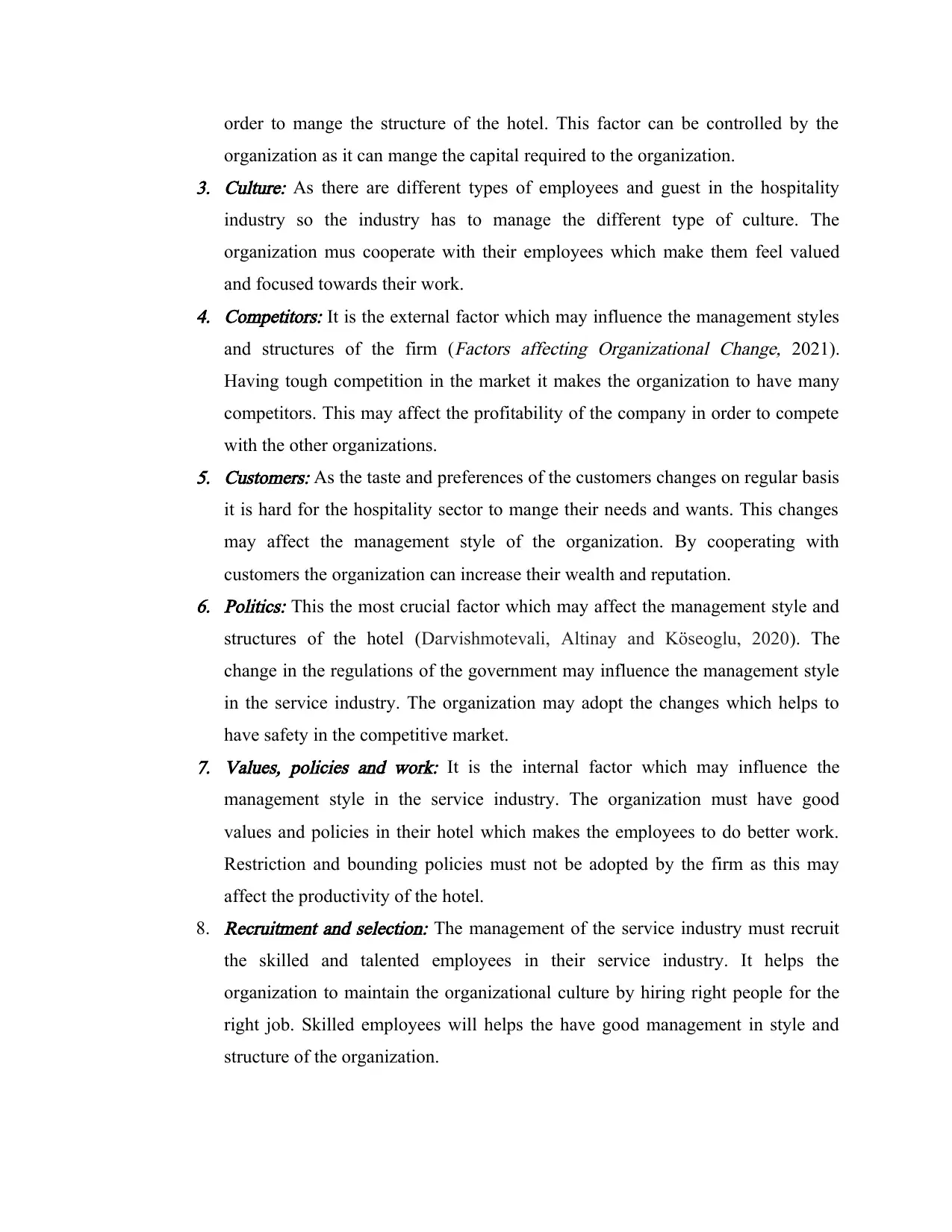
order to mange the structure of the hotel. This factor can be controlled by the
organization as it can mange the capital required to the organization.
3. Culture: As there are different types of employees and guest in the hospitality
industry so the industry has to manage the different type of culture. The
organization mus cooperate with their employees which make them feel valued
and focused towards their work.
4. Competitors: It is the external factor which may influence the management styles
and structures of the firm (
Factors affecting Organizational Change, 2021).
Having tough competition in the market it makes the organization to have many
competitors. This may affect the profitability of the company in order to compete
with the other organizations.
5. Customers: As the taste and preferences of the customers changes on regular basis
it is hard for the hospitality sector to mange their needs and wants. This changes
may affect the management style of the organization. By cooperating with
customers the organization can increase their wealth and reputation.
6. Politics: This the most crucial factor which may affect the management style and
structures of the hotel (Darvishmotevali, Altinay and Köseoglu, 2020). The
change in the regulations of the government may influence the management style
in the service industry. The organization may adopt the changes which helps to
have safety in the competitive market.
7. Values, policies and work: It is the internal factor which may influence the
management style in the service industry. The organization must have good
values and policies in their hotel which makes the employees to do better work.
Restriction and bounding policies must not be adopted by the firm as this may
affect the productivity of the hotel.
8.
Recruitment and selection: The management of the service industry must recruit
the skilled and talented employees in their service industry. It helps the
organization to maintain the organizational culture by hiring right people for the
right job. Skilled employees will helps the have good management in style and
structure of the organization.
organization as it can mange the capital required to the organization.
3. Culture: As there are different types of employees and guest in the hospitality
industry so the industry has to manage the different type of culture. The
organization mus cooperate with their employees which make them feel valued
and focused towards their work.
4. Competitors: It is the external factor which may influence the management styles
and structures of the firm (
Factors affecting Organizational Change, 2021).
Having tough competition in the market it makes the organization to have many
competitors. This may affect the profitability of the company in order to compete
with the other organizations.
5. Customers: As the taste and preferences of the customers changes on regular basis
it is hard for the hospitality sector to mange their needs and wants. This changes
may affect the management style of the organization. By cooperating with
customers the organization can increase their wealth and reputation.
6. Politics: This the most crucial factor which may affect the management style and
structures of the hotel (Darvishmotevali, Altinay and Köseoglu, 2020). The
change in the regulations of the government may influence the management style
in the service industry. The organization may adopt the changes which helps to
have safety in the competitive market.
7. Values, policies and work: It is the internal factor which may influence the
management style in the service industry. The organization must have good
values and policies in their hotel which makes the employees to do better work.
Restriction and bounding policies must not be adopted by the firm as this may
affect the productivity of the hotel.
8.
Recruitment and selection: The management of the service industry must recruit
the skilled and talented employees in their service industry. It helps the
organization to maintain the organizational culture by hiring right people for the
right job. Skilled employees will helps the have good management in style and
structure of the organization.
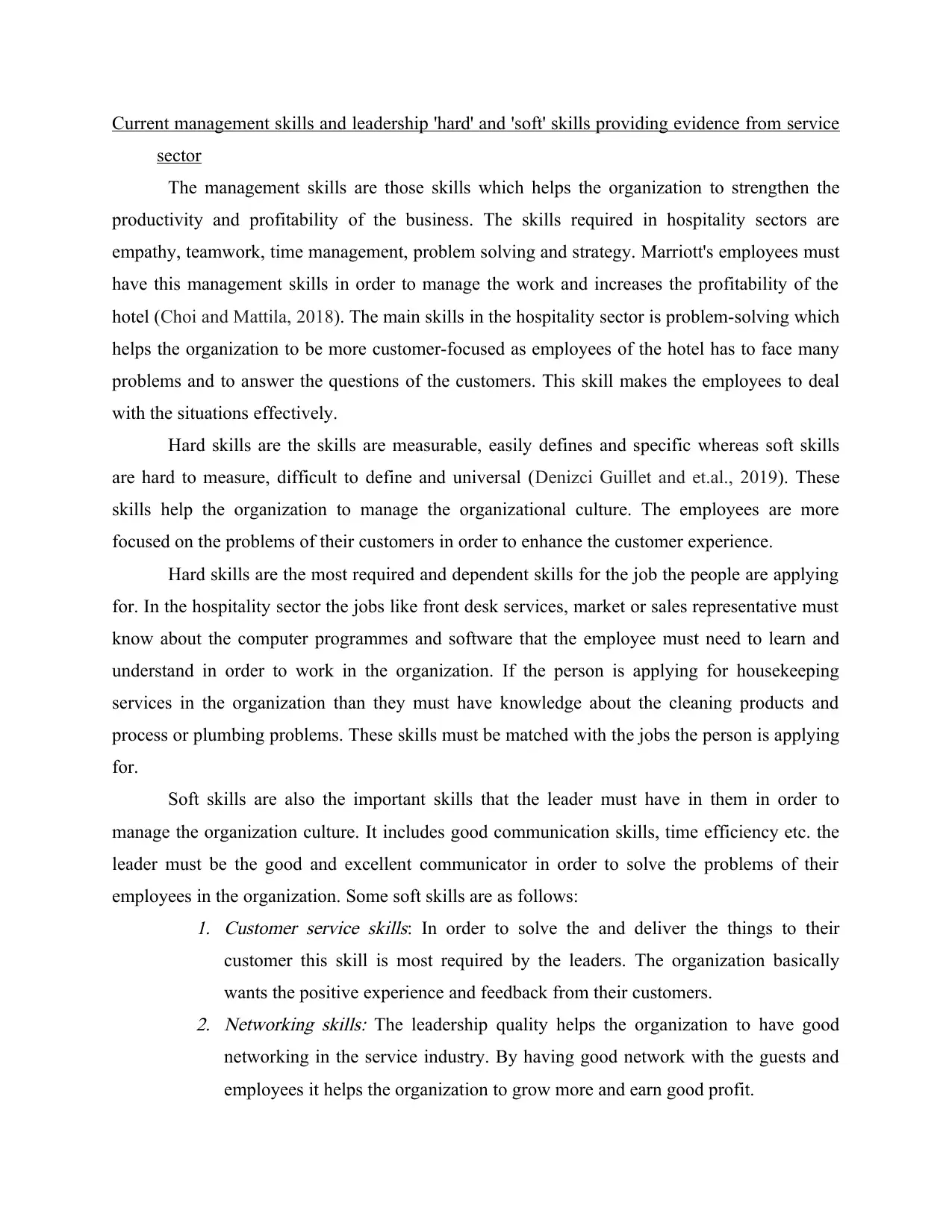
Current management skills and leadership 'hard' and 'soft' skills providing evidence from service
sector
The management skills are those skills which helps the organization to strengthen the
productivity and profitability of the business. The skills required in hospitality sectors are
empathy, teamwork, time management, problem solving and strategy. Marriott's employees must
have this management skills in order to manage the work and increases the profitability of the
hotel (Choi and Mattila, 2018). The main skills in the hospitality sector is problem-solving which
helps the organization to be more customer-focused as employees of the hotel has to face many
problems and to answer the questions of the customers. This skill makes the employees to deal
with the situations effectively.
Hard skills are the skills are measurable, easily defines and specific whereas soft skills
are hard to measure, difficult to define and universal (Denizci Guillet and et.al., 2019). These
skills help the organization to manage the organizational culture. The employees are more
focused on the problems of their customers in order to enhance the customer experience.
Hard skills are the most required and dependent skills for the job the people are applying
for. In the hospitality sector the jobs like front desk services, market or sales representative must
know about the computer programmes and software that the employee must need to learn and
understand in order to work in the organization. If the person is applying for housekeeping
services in the organization than they must have knowledge about the cleaning products and
process or plumbing problems. These skills must be matched with the jobs the person is applying
for.
Soft skills are also the important skills that the leader must have in them in order to
manage the organization culture. It includes good communication skills, time efficiency etc. the
leader must be the good and excellent communicator in order to solve the problems of their
employees in the organization. Some soft skills are as follows:
1. Customer service skills: In order to solve the and deliver the things to their
customer this skill is most required by the leaders. The organization basically
wants the positive experience and feedback from their customers.
2. Networking skills: The leadership quality helps the organization to have good
networking in the service industry. By having good network with the guests and
employees it helps the organization to grow more and earn good profit.
sector
The management skills are those skills which helps the organization to strengthen the
productivity and profitability of the business. The skills required in hospitality sectors are
empathy, teamwork, time management, problem solving and strategy. Marriott's employees must
have this management skills in order to manage the work and increases the profitability of the
hotel (Choi and Mattila, 2018). The main skills in the hospitality sector is problem-solving which
helps the organization to be more customer-focused as employees of the hotel has to face many
problems and to answer the questions of the customers. This skill makes the employees to deal
with the situations effectively.
Hard skills are the skills are measurable, easily defines and specific whereas soft skills
are hard to measure, difficult to define and universal (Denizci Guillet and et.al., 2019). These
skills help the organization to manage the organizational culture. The employees are more
focused on the problems of their customers in order to enhance the customer experience.
Hard skills are the most required and dependent skills for the job the people are applying
for. In the hospitality sector the jobs like front desk services, market or sales representative must
know about the computer programmes and software that the employee must need to learn and
understand in order to work in the organization. If the person is applying for housekeeping
services in the organization than they must have knowledge about the cleaning products and
process or plumbing problems. These skills must be matched with the jobs the person is applying
for.
Soft skills are also the important skills that the leader must have in them in order to
manage the organization culture. It includes good communication skills, time efficiency etc. the
leader must be the good and excellent communicator in order to solve the problems of their
employees in the organization. Some soft skills are as follows:
1. Customer service skills: In order to solve the and deliver the things to their
customer this skill is most required by the leaders. The organization basically
wants the positive experience and feedback from their customers.
2. Networking skills: The leadership quality helps the organization to have good
networking in the service industry. By having good network with the guests and
employees it helps the organization to grow more and earn good profit.
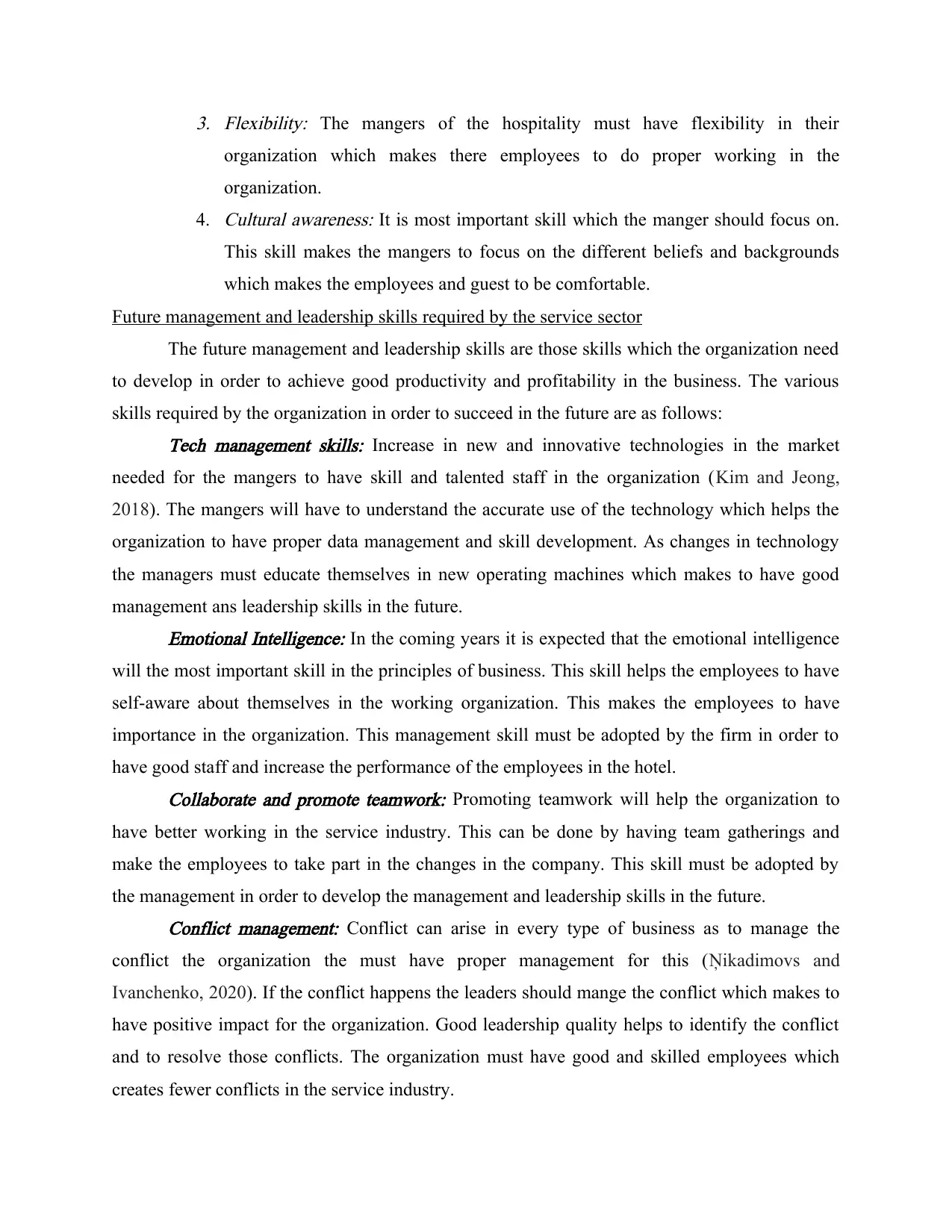
3. Flexibility: The mangers of the hospitality must have flexibility in their
organization which makes there employees to do proper working in the
organization.
4.
Cultural awareness: It is most important skill which the manger should focus on.
This skill makes the mangers to focus on the different beliefs and backgrounds
which makes the employees and guest to be comfortable.
Future management and leadership skills required by the service sector
The future management and leadership skills are those skills which the organization need
to develop in order to achieve good productivity and profitability in the business. The various
skills required by the organization in order to succeed in the future are as follows:
Tech management skills: Increase in new and innovative technologies in the market
needed for the mangers to have skill and talented staff in the organization (Kim and Jeong,
2018). The mangers will have to understand the accurate use of the technology which helps the
organization to have proper data management and skill development. As changes in technology
the managers must educate themselves in new operating machines which makes to have good
management ans leadership skills in the future.
Emotional Intelligence: In the coming years it is expected that the emotional intelligence
will the most important skill in the principles of business. This skill helps the employees to have
self-aware about themselves in the working organization. This makes the employees to have
importance in the organization. This management skill must be adopted by the firm in order to
have good staff and increase the performance of the employees in the hotel.
Collaborate and promote teamwork: Promoting teamwork will help the organization to
have better working in the service industry. This can be done by having team gatherings and
make the employees to take part in the changes in the company. This skill must be adopted by
the management in order to develop the management and leadership skills in the future.
Conflict management: Conflict can arise in every type of business as to manage the
conflict the organization the must have proper management for this (Ņikadimovs and
Ivanchenko, 2020). If the conflict happens the leaders should mange the conflict which makes to
have positive impact for the organization. Good leadership quality helps to identify the conflict
and to resolve those conflicts. The organization must have good and skilled employees which
creates fewer conflicts in the service industry.
organization which makes there employees to do proper working in the
organization.
4.
Cultural awareness: It is most important skill which the manger should focus on.
This skill makes the mangers to focus on the different beliefs and backgrounds
which makes the employees and guest to be comfortable.
Future management and leadership skills required by the service sector
The future management and leadership skills are those skills which the organization need
to develop in order to achieve good productivity and profitability in the business. The various
skills required by the organization in order to succeed in the future are as follows:
Tech management skills: Increase in new and innovative technologies in the market
needed for the mangers to have skill and talented staff in the organization (Kim and Jeong,
2018). The mangers will have to understand the accurate use of the technology which helps the
organization to have proper data management and skill development. As changes in technology
the managers must educate themselves in new operating machines which makes to have good
management ans leadership skills in the future.
Emotional Intelligence: In the coming years it is expected that the emotional intelligence
will the most important skill in the principles of business. This skill helps the employees to have
self-aware about themselves in the working organization. This makes the employees to have
importance in the organization. This management skill must be adopted by the firm in order to
have good staff and increase the performance of the employees in the hotel.
Collaborate and promote teamwork: Promoting teamwork will help the organization to
have better working in the service industry. This can be done by having team gatherings and
make the employees to take part in the changes in the company. This skill must be adopted by
the management in order to develop the management and leadership skills in the future.
Conflict management: Conflict can arise in every type of business as to manage the
conflict the organization the must have proper management for this (Ņikadimovs and
Ivanchenko, 2020). If the conflict happens the leaders should mange the conflict which makes to
have positive impact for the organization. Good leadership quality helps to identify the conflict
and to resolve those conflicts. The organization must have good and skilled employees which
creates fewer conflicts in the service industry.
Secure Best Marks with AI Grader
Need help grading? Try our AI Grader for instant feedback on your assignments.
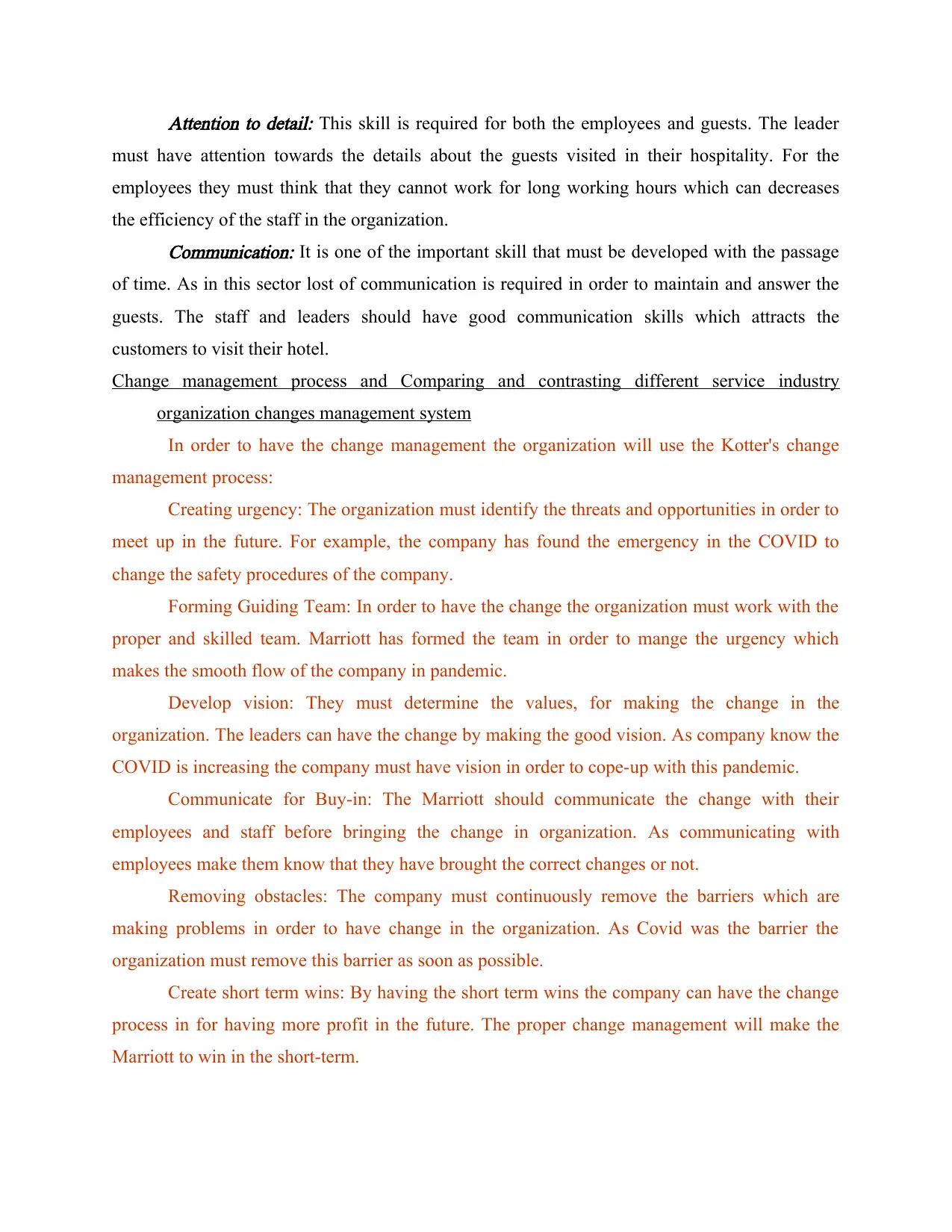
Attention to detail: This skill is required for both the employees and guests. The leader
must have attention towards the details about the guests visited in their hospitality. For the
employees they must think that they cannot work for long working hours which can decreases
the efficiency of the staff in the organization.
Communication: It is one of the important skill that must be developed with the passage
of time. As in this sector lost of communication is required in order to maintain and answer the
guests. The staff and leaders should have good communication skills which attracts the
customers to visit their hotel.
Change management process and Comparing and contrasting different service industry
organization changes management system
In order to have the change management the organization will use the Kotter's change
management process:
Creating urgency: The organization must identify the threats and opportunities in order to
meet up in the future. For example, the company has found the emergency in the COVID to
change the safety procedures of the company.
Forming Guiding Team: In order to have the change the organization must work with the
proper and skilled team. Marriott has formed the team in order to mange the urgency which
makes the smooth flow of the company in pandemic.
Develop vision: They must determine the values, for making the change in the
organization. The leaders can have the change by making the good vision. As company know the
COVID is increasing the company must have vision in order to cope-up with this pandemic.
Communicate for Buy-in: The Marriott should communicate the change with their
employees and staff before bringing the change in organization. As communicating with
employees make them know that they have brought the correct changes or not.
Removing obstacles: The company must continuously remove the barriers which are
making problems in order to have change in the organization. As Covid was the barrier the
organization must remove this barrier as soon as possible.
Create short term wins: By having the short term wins the company can have the change
process in for having more profit in the future. The proper change management will make the
Marriott to win in the short-term.
must have attention towards the details about the guests visited in their hospitality. For the
employees they must think that they cannot work for long working hours which can decreases
the efficiency of the staff in the organization.
Communication: It is one of the important skill that must be developed with the passage
of time. As in this sector lost of communication is required in order to maintain and answer the
guests. The staff and leaders should have good communication skills which attracts the
customers to visit their hotel.
Change management process and Comparing and contrasting different service industry
organization changes management system
In order to have the change management the organization will use the Kotter's change
management process:
Creating urgency: The organization must identify the threats and opportunities in order to
meet up in the future. For example, the company has found the emergency in the COVID to
change the safety procedures of the company.
Forming Guiding Team: In order to have the change the organization must work with the
proper and skilled team. Marriott has formed the team in order to mange the urgency which
makes the smooth flow of the company in pandemic.
Develop vision: They must determine the values, for making the change in the
organization. The leaders can have the change by making the good vision. As company know the
COVID is increasing the company must have vision in order to cope-up with this pandemic.
Communicate for Buy-in: The Marriott should communicate the change with their
employees and staff before bringing the change in organization. As communicating with
employees make them know that they have brought the correct changes or not.
Removing obstacles: The company must continuously remove the barriers which are
making problems in order to have change in the organization. As Covid was the barrier the
organization must remove this barrier as soon as possible.
Create short term wins: By having the short term wins the company can have the change
process in for having more profit in the future. The proper change management will make the
Marriott to win in the short-term.
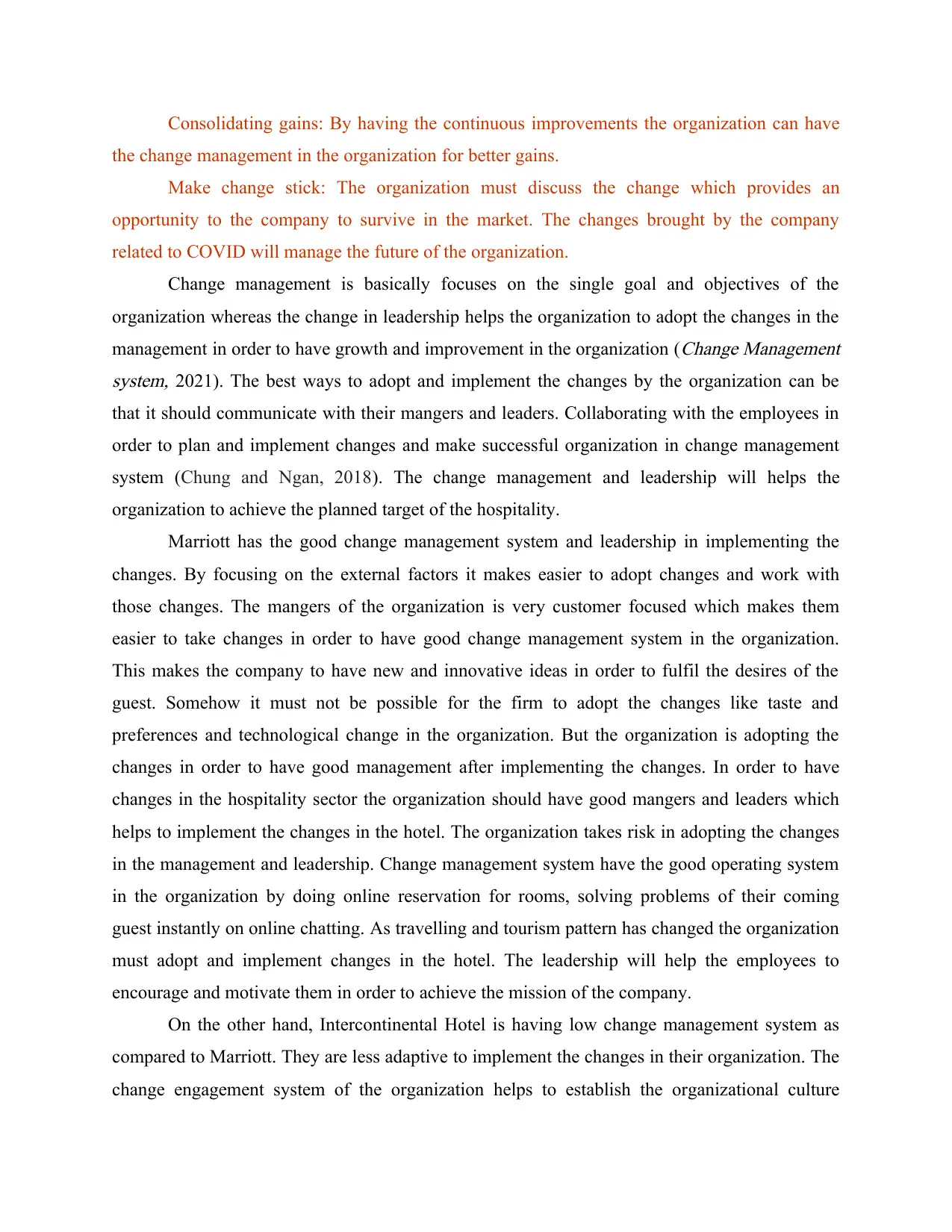
Consolidating gains: By having the continuous improvements the organization can have
the change management in the organization for better gains.
Make change stick: The organization must discuss the change which provides an
opportunity to the company to survive in the market. The changes brought by the company
related to COVID will manage the future of the organization.
Change management is basically focuses on the single goal and objectives of the
organization whereas the change in leadership helps the organization to adopt the changes in the
management in order to have growth and improvement in the organization (
Change Management
system, 2021). The best ways to adopt and implement the changes by the organization can be
that it should communicate with their mangers and leaders. Collaborating with the employees in
order to plan and implement changes and make successful organization in change management
system (Chung and Ngan, 2018). The change management and leadership will helps the
organization to achieve the planned target of the hospitality.
Marriott has the good change management system and leadership in implementing the
changes. By focusing on the external factors it makes easier to adopt changes and work with
those changes. The mangers of the organization is very customer focused which makes them
easier to take changes in order to have good change management system in the organization.
This makes the company to have new and innovative ideas in order to fulfil the desires of the
guest. Somehow it must not be possible for the firm to adopt the changes like taste and
preferences and technological change in the organization. But the organization is adopting the
changes in order to have good management after implementing the changes. In order to have
changes in the hospitality sector the organization should have good mangers and leaders which
helps to implement the changes in the hotel. The organization takes risk in adopting the changes
in the management and leadership. Change management system have the good operating system
in the organization by doing online reservation for rooms, solving problems of their coming
guest instantly on online chatting. As travelling and tourism pattern has changed the organization
must adopt and implement changes in the hotel. The leadership will help the employees to
encourage and motivate them in order to achieve the mission of the company.
On the other hand, Intercontinental Hotel is having low change management system as
compared to Marriott. They are less adaptive to implement the changes in their organization. The
change engagement system of the organization helps to establish the organizational culture
the change management in the organization for better gains.
Make change stick: The organization must discuss the change which provides an
opportunity to the company to survive in the market. The changes brought by the company
related to COVID will manage the future of the organization.
Change management is basically focuses on the single goal and objectives of the
organization whereas the change in leadership helps the organization to adopt the changes in the
management in order to have growth and improvement in the organization (
Change Management
system, 2021). The best ways to adopt and implement the changes by the organization can be
that it should communicate with their mangers and leaders. Collaborating with the employees in
order to plan and implement changes and make successful organization in change management
system (Chung and Ngan, 2018). The change management and leadership will helps the
organization to achieve the planned target of the hospitality.
Marriott has the good change management system and leadership in implementing the
changes. By focusing on the external factors it makes easier to adopt changes and work with
those changes. The mangers of the organization is very customer focused which makes them
easier to take changes in order to have good change management system in the organization.
This makes the company to have new and innovative ideas in order to fulfil the desires of the
guest. Somehow it must not be possible for the firm to adopt the changes like taste and
preferences and technological change in the organization. But the organization is adopting the
changes in order to have good management after implementing the changes. In order to have
changes in the hospitality sector the organization should have good mangers and leaders which
helps to implement the changes in the hotel. The organization takes risk in adopting the changes
in the management and leadership. Change management system have the good operating system
in the organization by doing online reservation for rooms, solving problems of their coming
guest instantly on online chatting. As travelling and tourism pattern has changed the organization
must adopt and implement changes in the hotel. The leadership will help the employees to
encourage and motivate them in order to achieve the mission of the company.
On the other hand, Intercontinental Hotel is having low change management system as
compared to Marriott. They are less adaptive to implement the changes in their organization. The
change engagement system of the organization helps to establish the organizational culture
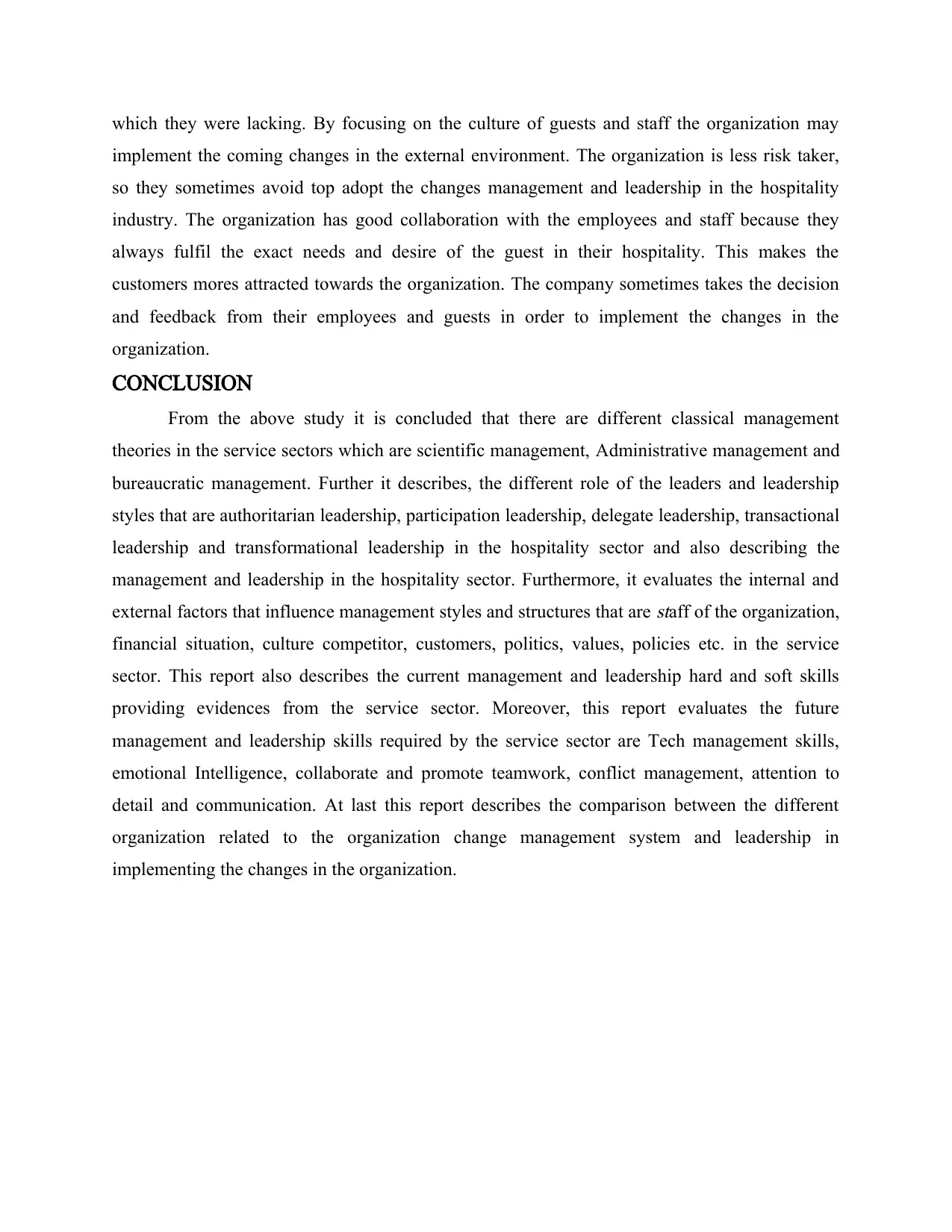
which they were lacking. By focusing on the culture of guests and staff the organization may
implement the coming changes in the external environment. The organization is less risk taker,
so they sometimes avoid top adopt the changes management and leadership in the hospitality
industry. The organization has good collaboration with the employees and staff because they
always fulfil the exact needs and desire of the guest in their hospitality. This makes the
customers mores attracted towards the organization. The company sometimes takes the decision
and feedback from their employees and guests in order to implement the changes in the
organization.
CONCLUSION
From the above study it is concluded that there are different classical management
theories in the service sectors which are scientific management, Administrative management and
bureaucratic management. Further it describes, the different role of the leaders and leadership
styles that are authoritarian leadership, participation leadership, delegate leadership, transactional
leadership and transformational leadership in the hospitality sector and also describing the
management and leadership in the hospitality sector. Furthermore, it evaluates the internal and
external factors that influence management styles and structures that are
staff of the organization,
financial situation, culture competitor, customers, politics, values, policies etc. in the service
sector. This report also describes the current management and leadership hard and soft skills
providing evidences from the service sector. Moreover, this report evaluates the future
management and leadership skills required by the service sector are Tech management skills,
emotional Intelligence, collaborate and promote teamwork, conflict management, attention to
detail and communication. At last this report describes the comparison between the different
organization related to the organization change management system and leadership in
implementing the changes in the organization.
implement the coming changes in the external environment. The organization is less risk taker,
so they sometimes avoid top adopt the changes management and leadership in the hospitality
industry. The organization has good collaboration with the employees and staff because they
always fulfil the exact needs and desire of the guest in their hospitality. This makes the
customers mores attracted towards the organization. The company sometimes takes the decision
and feedback from their employees and guests in order to implement the changes in the
organization.
CONCLUSION
From the above study it is concluded that there are different classical management
theories in the service sectors which are scientific management, Administrative management and
bureaucratic management. Further it describes, the different role of the leaders and leadership
styles that are authoritarian leadership, participation leadership, delegate leadership, transactional
leadership and transformational leadership in the hospitality sector and also describing the
management and leadership in the hospitality sector. Furthermore, it evaluates the internal and
external factors that influence management styles and structures that are
staff of the organization,
financial situation, culture competitor, customers, politics, values, policies etc. in the service
sector. This report also describes the current management and leadership hard and soft skills
providing evidences from the service sector. Moreover, this report evaluates the future
management and leadership skills required by the service sector are Tech management skills,
emotional Intelligence, collaborate and promote teamwork, conflict management, attention to
detail and communication. At last this report describes the comparison between the different
organization related to the organization change management system and leadership in
implementing the changes in the organization.
Paraphrase This Document
Need a fresh take? Get an instant paraphrase of this document with our AI Paraphraser
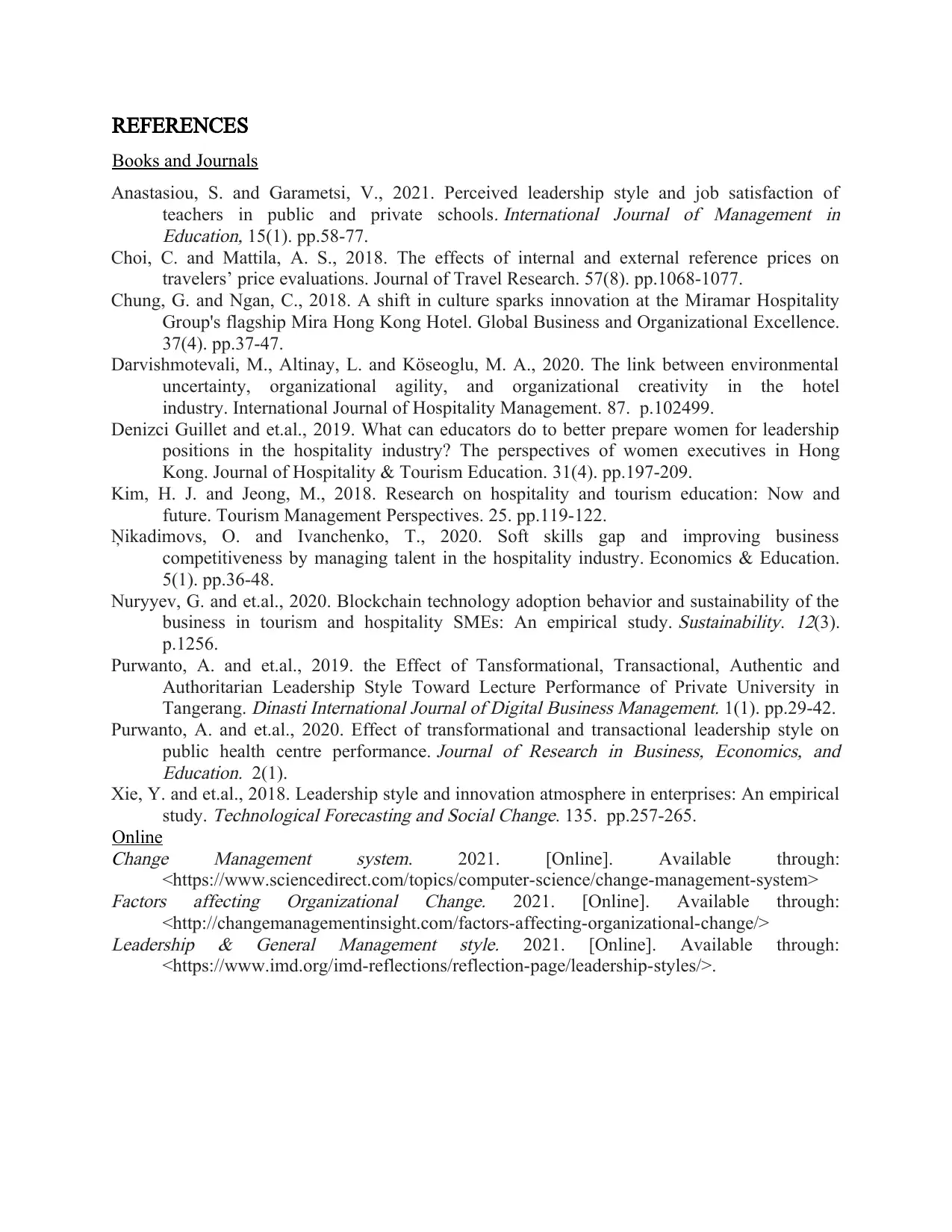
REFERENCES
Books and Journals
Anastasiou, S. and Garametsi, V., 2021. Perceived leadership style and job satisfaction of
teachers in public and private schools
. International Journal of Management in
Education, 15(1). pp.58-77.
Choi, C. and Mattila, A. S., 2018. The effects of internal and external reference prices on
travelers’ price evaluations. Journal of Travel Research. 57(8). pp.1068-1077.
Chung, G. and Ngan, C., 2018. A shift in culture sparks innovation at the Miramar Hospitality
Group's flagship Mira Hong Kong Hotel. Global Business and Organizational Excellence.
37(4). pp.37-47.
Darvishmotevali, M., Altinay, L. and Köseoglu, M. A., 2020. The link between environmental
uncertainty, organizational agility, and organizational creativity in the hotel
industry. International Journal of Hospitality Management. 87. p.102499.
Denizci Guillet and et.al., 2019. What can educators do to better prepare women for leadership
positions in the hospitality industry? The perspectives of women executives in Hong
Kong. Journal of Hospitality & Tourism Education. 31(4). pp.197-209.
Kim, H. J. and Jeong, M., 2018. Research on hospitality and tourism education: Now and
future. Tourism Management Perspectives. 25. pp.119-122.
Ņikadimovs, O. and Ivanchenko, T., 2020. Soft skills gap and improving business
competitiveness by managing talent in the hospitality industry. Economics & Education.
5(1). pp.36-48.
Nuryyev, G. and et.al., 2020. Blockchain technology adoption behavior and sustainability of the
business in tourism and hospitality SMEs: An empirical study.
Sustainability.
12(3).
p.1256.
Purwanto, A. and et.al., 2019. the Effect of Tansformational, Transactional, Authentic and
Authoritarian Leadership Style Toward Lecture Performance of Private University in
Tangerang.
Dinasti International Journal of Digital Business Management. 1(1). pp.29-42.
Purwanto, A. and et.al., 2020. Effect of transformational and transactional leadership style on
public health centre performance.
Journal of Research in Business, Economics, and
Education. 2(1).
Xie, Y. and et.al., 2018. Leadership style and innovation atmosphere in enterprises: An empirical
study.
Technological Forecasting and Social Change. 135. pp.257-265.
OnlineChange Management system. 2021. [Online]. Available through:
<https://www.sciencedirect.com/topics/computer-science/change-management-system>Factors affecting Organizational Change. 2021. [Online]. Available through:
<http://changemanagementinsight.com/factors-affecting-organizational-change/>Leadership & General Management style. 2021. [Online]. Available through:
<https://www.imd.org/imd-reflections/reflection-page/leadership-styles/>.
Books and Journals
Anastasiou, S. and Garametsi, V., 2021. Perceived leadership style and job satisfaction of
teachers in public and private schools
. International Journal of Management in
Education, 15(1). pp.58-77.
Choi, C. and Mattila, A. S., 2018. The effects of internal and external reference prices on
travelers’ price evaluations. Journal of Travel Research. 57(8). pp.1068-1077.
Chung, G. and Ngan, C., 2018. A shift in culture sparks innovation at the Miramar Hospitality
Group's flagship Mira Hong Kong Hotel. Global Business and Organizational Excellence.
37(4). pp.37-47.
Darvishmotevali, M., Altinay, L. and Köseoglu, M. A., 2020. The link between environmental
uncertainty, organizational agility, and organizational creativity in the hotel
industry. International Journal of Hospitality Management. 87. p.102499.
Denizci Guillet and et.al., 2019. What can educators do to better prepare women for leadership
positions in the hospitality industry? The perspectives of women executives in Hong
Kong. Journal of Hospitality & Tourism Education. 31(4). pp.197-209.
Kim, H. J. and Jeong, M., 2018. Research on hospitality and tourism education: Now and
future. Tourism Management Perspectives. 25. pp.119-122.
Ņikadimovs, O. and Ivanchenko, T., 2020. Soft skills gap and improving business
competitiveness by managing talent in the hospitality industry. Economics & Education.
5(1). pp.36-48.
Nuryyev, G. and et.al., 2020. Blockchain technology adoption behavior and sustainability of the
business in tourism and hospitality SMEs: An empirical study.
Sustainability.
12(3).
p.1256.
Purwanto, A. and et.al., 2019. the Effect of Tansformational, Transactional, Authentic and
Authoritarian Leadership Style Toward Lecture Performance of Private University in
Tangerang.
Dinasti International Journal of Digital Business Management. 1(1). pp.29-42.
Purwanto, A. and et.al., 2020. Effect of transformational and transactional leadership style on
public health centre performance.
Journal of Research in Business, Economics, and
Education. 2(1).
Xie, Y. and et.al., 2018. Leadership style and innovation atmosphere in enterprises: An empirical
study.
Technological Forecasting and Social Change. 135. pp.257-265.
OnlineChange Management system. 2021. [Online]. Available through:
<https://www.sciencedirect.com/topics/computer-science/change-management-system>Factors affecting Organizational Change. 2021. [Online]. Available through:
<http://changemanagementinsight.com/factors-affecting-organizational-change/>Leadership & General Management style. 2021. [Online]. Available through:
<https://www.imd.org/imd-reflections/reflection-page/leadership-styles/>.
1 out of 14
Related Documents
Your All-in-One AI-Powered Toolkit for Academic Success.
+13062052269
info@desklib.com
Available 24*7 on WhatsApp / Email
![[object Object]](/_next/static/media/star-bottom.7253800d.svg)
Unlock your academic potential
© 2024 | Zucol Services PVT LTD | All rights reserved.





